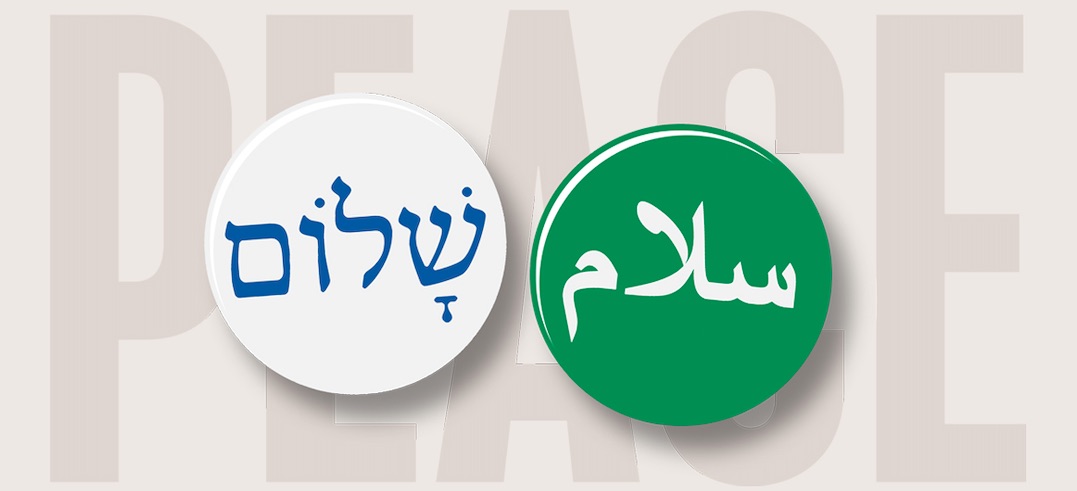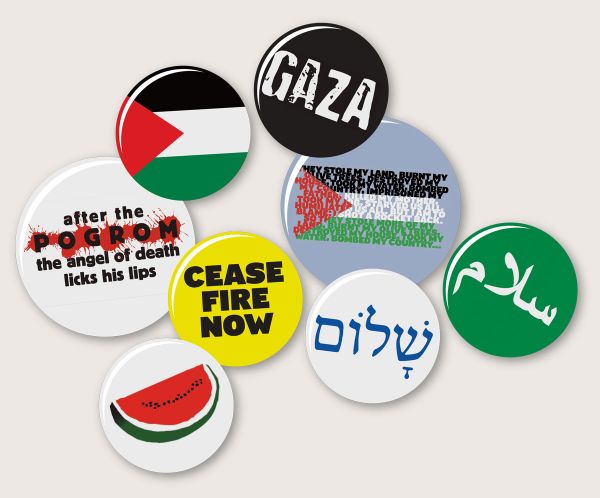
Peace isn't a four-letter word
09.12.23
Philosophy Football's Mark Perryman argues the horrors of Hamas and the demolition of Gaza demand peace and justice for both Palestine and Israel

' Peace' is a word, particularly at Christmastime, that has a near universal appeal. Yet as Israel continues to reel from the bloody horrors committed by Hamas on 7 October and Palestine struggles to survive the reduction of Gaza to a sea of rubble and the murderous attacks launched from the West Bank illegal settlements it is a word almost entirely absent from every discourse around this seemingly never-ending conflict.
For some, on both sides, there is only ever going to be a military solution There won't be.
Others, on both sides, favour a diplomatic solution that stops the fighting but fails to address the causes. That won't work either.
I don't always agree with Jonathan Freedland's column in a Saturday Guardian but they always make me think. Generally I find I learn more from someone I disagree with on abc but find myself in agreement on xyz than from those I entirely agree with on everything.
Jonathan's column on 14 October seven days after the horrors committed by was absolute testament to this maxim of mine.
In all the hundreds of thousands, millions of words written on Hamas and Gaza since there were ten words in his piece that sum up the context of this entire nightmare up better than anything.
'After the Pogrom’ the 19th century pogroms across eastern Europe, the Jewish refugees to western Europe, Cable Street, Jews and Socialists, Communists, Irish immigrants stopping Mosley, together, the Holocaust, on 7 October descendants from the latter murdered by Hamas
'The Angel of Death' the IDF from land, sea and air reducing Gaza to a sea of rubble, hospitals. schools, houses destroyed. The attacks in Southern Gaza a supposed ’safe haven’. A war crime
'Licks his lips' Hamas and Netanyahu. None of this will stop either of them.
Ten words, that explain precisely why neither the Hamas terror attack nor the 4000 plus Palestinian children killed by the heavily armed entirely indiscriminate IDF assault on Gaza will bring peace, and justice, to Israel and Palestine any closer at all, in fact quite the reverse. Because of course both Hamas and Netanyahu share the same objective. Neither has any interest in such a shared and peaceful outcome.
Now I'm not claiming Jonathan shares all the same aims as the Palestine Solidarity protests, there was another one lasr Saturday. And you know what, I don't care, because as much as I support the protests and have marched myself, to reverse this inhuman nightmare we have to be bigger, braver and bolder.
A common misconception is that if a movement is broadened, it is weakened. But if support for Palestine is limited only to those who subscribe to an entire repudiation of Israel then Palestine will never be free of the suffering currently being forced upon Gaza and the West Bank.
Paul Kelemen in his excellent book The British Left and Zionism : History of a Divorce describes an 'awkwardness' arising out of historical context. An 'awkwardness' which he very neatly sums up as on the one hand 'Israel's establishment emerged out of the triumph over fascism and as a restitution to the Jewish people for the Nazi Holocaust'. But on the other hand it was also 'the product of imperial expansion'. However awkward it might be, to unilaterally subscribe to either one without the other is a politics to no good effect.
Purity of intent warms the activist's ideological cockles but as a practical politics fails miserably over, and over again.
The failure is rooted in a fundamental misconception. Supporting Palestine doesn't require being on the Left end of the political spectrum. For all that Jeremy Corbyn and Zara Sultana, Tariq Ali, the far left groups who provide much of activist infrastructure of the campaign and others of a left politics bring to the movement, and they, bring an awful lot, if this is the public sum of our political parts then Palestine will never attract the breadth of support it needs to break this lethal impasse.
When Scottish Labour leader Anas Sarwar, Labour Mayor of Greater Manchester Andy Burnham, Labour Mayor of West Yorkshire Tracy Brabin, Labour MPs Dawn Butler, Jess Philips, Jon Cruddas, Naz Shah, Rosena Allin-Khan, Rupa Huq, Stella Creasy ,Yasmin Qureshi rebel to support an immediate ceasefire the significance should be obvious. None of these Labour rebels would identify with Labour's hard left. And there are many, many more from where that lot come from politically , if the means cannot be made to broaden, to accommodate, what good does that do Palestine's cause?
Meanwhile in Lewes, where one half of Philosophy Football is based, the weekend after the vote on the ceasefire a protest was called against our local Labour Party by Palestine Solidarity activists for 'allying with genocide'. Mmm, with apologies to Lenny Bruce, ' the how to lose friends and not influence people' strategy.
'Humanitarian Pause' vs 'Immediate Ceasefire' has of course divided a Labour Party previously characterised by its near overwhelming unity behind Keir Starmer. Yet however committed, including me, many are to the immediate ceasefire what harm does it do also to recognise that those equally committed to a pause share with us one core objective, we want this human carnage to stop and doesn't that matter most of all?
And those Labour MPs who didn't vote for the ceasefire? Noisy banner-waving protests outside their constituency offices are the easy option and achieve precisely nothing. The hard work lies with turning marching to door-knocking, Street by street collecting thousands, tens of thousands of their constituents' signatures, Labour voters who want their MP to back the ceasefire, and for every household in support a window poster. This is the language the Labour Party understands, and the effort Palestine surely deserves.
What Palestine also deserves is the broadest possible support and there should be no self-imposed limits to that ambition. Ben Bradshaw, Labour MP, fiercely loyal to Blair and now Starmer, he didn't vote for the ceasefire yet with his background as a BBC Middle East Correspondent has made some of the best ever House of Commons speeches on Israel, well informed and hugely critical. Humza Yousaf SNP leader who had family members trapped in Gaza, Layla Moran, Liberal Democrat and the only MP of Palestinian descent who lost family members in Gaza and unbelievably was told by the Speaker this was inappropriate to mention in a Parliamentary debate. And one of the most vocal supporters of Palestine and sternest critics of Israel? Sayeeda Warsi, Tory Peer and former Co-Chairwoman of the Conservative Party.
The list, and the breadth, goes on, and wide.
And not just breadth but means too. However big, however necessary, marches will only appeal to some, but not all. Two examples of the potential.
Yotam Ottolenghi, the Israeli-born British chef and author of best-selling recipe books has helped pioneer the popularity of Palestinian cuisine. Zaytoun import and promote Palestinian delicacies to add such meals both authenticity and purpose. And both link the tasty meals produced directly to the mistreatment of the land and the farms from whence they came.
Or football. Why is it never, ever, questioned why Israel's national team and league clubs compete in European UEFA competitions instead of the Asian Football Confederation where they belong and were members of from 1954 to 1974 when it was forced to leave because no other country would play Israel because of the country's mistreatment of the Palestinians. Meanwhile one of the few arenas in which Palestinian statehood is recognised, by all, is the football pitch. A Palestine national team, competing proudly in Asian Federation competitions. And in the wider sporting orbit 40 years after the murderous Israeli hostage-taking by the Palestinian terror group Black September at the Munich 1972 Olympics, Team Palestine marching proudly behind the Palestinian Flag at the opening ceremony of the London 2012 Olympics. In such spaces Palestine already exists, providing the basis for a common-sense recognition of statehood yet outside of the realm of protest politics barely noticed.
No, like wearing badges, negotiating the 'awkwardness'; of Israel's foundation as a nation-state in 1948, welcoming the support for Palestin of those we otherwise disagree with, finding popular and positive means to identify with and support Palestinian statehood, each on their own isn't enough. But like badges, each can be the start towards something more than the sum of its parts. A popular process of peace, for Israel and for Palestine, no longer being a four-letter word. Now that's a badge worth wearing.
 The Arabic and Hebrew 'peace' badges are available as part of a pack, with T-shirts too, from Philosophy Football here
The Arabic and Hebrew 'peace' badges are available as part of a pack, with T-shirts too, from Philosophy Football here
Mark Perryman is the co-founder of the self-styled 'sporting outfitters of intellectual distinction' aka Philosophy Football